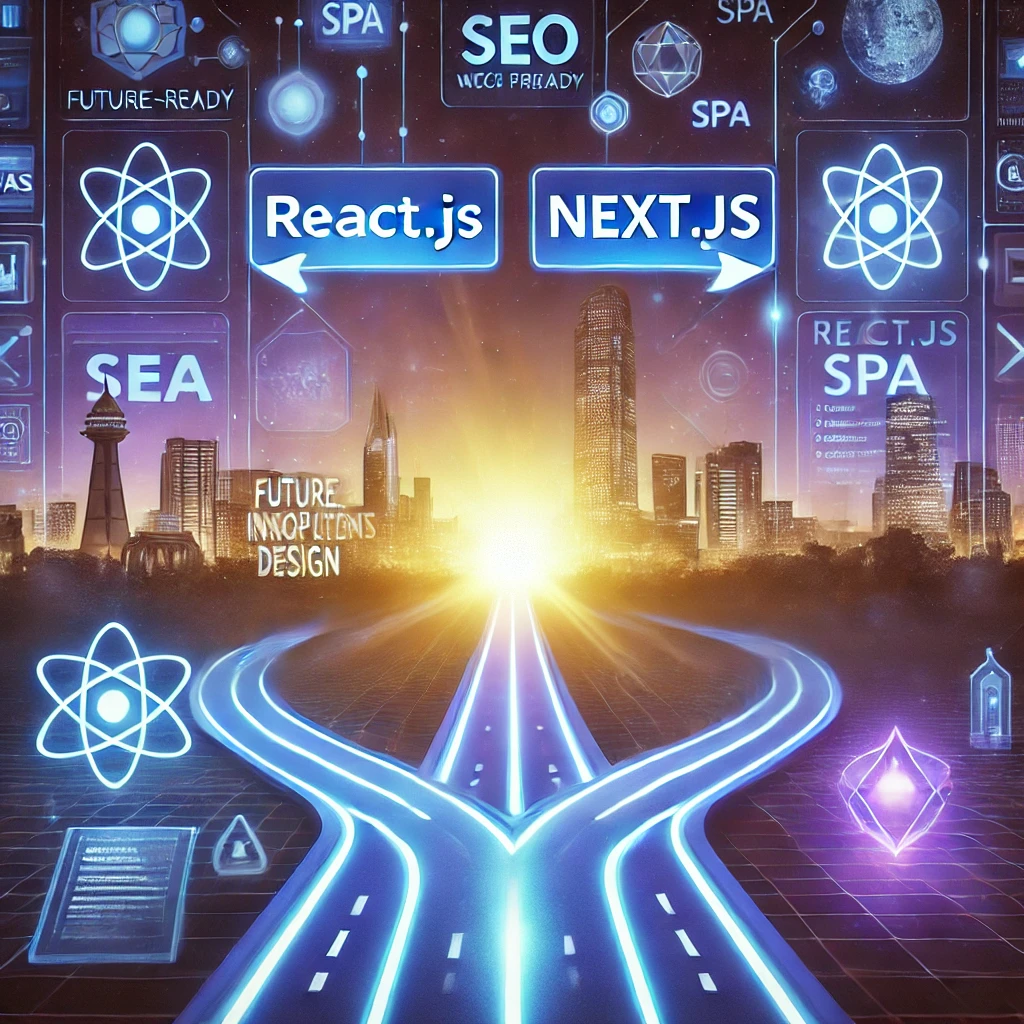Next.js vs. React.js: Which One Powers the Future of Web?
 KSOFTTECHNOlOGIES
KSOFTTECHNOlOGIESIn today's fast-evolving tech space, businesses face a pivotal decision when building modern websites and apps: Next.js or React.js? While both are based on JavaScript and designed to create powerful web experiences, the choice between them in 2025 is more strategic than ever.
At the heart of this debate lies the need for Responsive Web Design, smarter workflows, and next-gen capabilities like Web Development AI and Website Design AI. If you're aiming to stay ahead in the digital race, knowing which technology serves your business goals better is critical.
Let's dive deep into the key differences, advantages, and future potential of both frameworks.

Understanding the Basics
What is React.js?
React.js is an open-source JavaScript library developed by Facebook. It allows developers to build interactive UIs with reusable components. It became the go-to choice for single-page applications (SPAs) thanks to its speed and flexibility.
React.js gives developers immense freedom. But with great power comes great responsibility: you have to manually set up routing, server-side rendering (SSR), and optimization tools. In 2025, many businesses still turn to React for quick, dynamic front-end solutions, especially in custom software development services.
What is Next.js?
Next.js, built on top of React, is a full-fledged framework designed to address React's limitations. Developed by Vercel, it offers out-of-the-box solutions like file-based routing, server-side rendering (SSR), static site generation (SSG), and built-in API routes.
In short, if React is the engine, Next.js is the complete car.
Next.js is growing rapidly, especially among enterprises looking for faster time-to-market, SEO readiness, and integrations with emerging trends like Website Design AI and Web Development AI.
Key Differences That Matter in 2025
1. Performance and SEO
Businesses in 2025 demand lightning-fast load times and high discoverability. Next.js leads with server-side rendering and static generation, making it a powerhouse for SEO. Sites built on Next.js rank better, load faster, and create a more engaging experience, a critical factor in Ecommerce Website Development and high-traffic platforms.
React.js can achieve similar results, but it requires third-party tools and significant custom work.
2. Developer Experience
Both React and Next.js provide a great developer experience. But Next.js, with its zero-config philosophy, streamlines the process. Features like API routes, automatic code splitting, and image optimization mean developers can focus more oninnovation and less on setup.
Responsive Web Design is easier with Next.js because of built-in image optimization and flexible layout rendering, essential for today’s mobile-first world.
3. Flexibility vs. Productivity
React.js gives unmatched flexibility. You can tailor every piece to your exact needs. However, it can also slow down projects if not managed well.
Next.js improves productivity with opinionated structures and built-in capabilities. In 2025, businesses seeking rapid scaling, especially through Ecommerce and custom development, find Next.js a safer, faster route.
4. AI Integration and Future Readiness
As Web Development AI and Website Design AI technologies rise, frameworks need to adapt. Next.js has a strong roadmap towards AI integrations and serverless architectures.
AI-driven optimizations, personalization, and smart analytics are becoming essential for industries from healthcare to retail. Using Next.js with AI tools means your project is future-proofed for the next big leap.
React.js, while flexible, needs more manual integration work for AI-based features.
When Should You Choose React.js?
Despite Next.js's popularity, React.js still shines in certain areas:
- Simple Projects: If you're building a small tool, dashboard, or SPA without needing SEO.
- Custom Requirements: When you need a highly customized build without predefined restrictions.
- Existing Infrastructure: If your systems already heavily rely on React.js libraries and setups.
Partnering with the best software developers USA ensures you get the right structure when building directly with React.
React's strong community support also ensures constant innovation. New libraries, components, and solutions are emerging every month, keeping React.js a lively and evolving ecosystem.
Moreover, developers familiar with React often find it easier to experiment with new ideas and customized workflows, especially when building MVPs or proof-of-concept apps.
When Should You Choose Next.js?
In 2025, Next.js is the default choice for:
- SEO-driven Platforms: Content sites, blogs, and product websites that must perform well on search engines.
- Ecommerce Websites: Sites needing fast load times, scalability, and security.
- Enterprise Apps: Large-scale apps that benefit from built-in SSR, SSG, and API handling.
- AI Integration: Platforms preparing for AI-enhanced features and scalability.
Companies choosing Next.js often work with a professional website design company that understands its ecosystem fully.
Next.js’s commitment to optimizing performance and accessibility out-of-the-box makes it ideal for brands focused on creating inclusive, future-proof experiences. Its dynamic routing and hybrid rendering capabilities make it highly adaptable for businesses that need to expand fast.
Future Trends Impacting Next.js and React.js
Serverless and Edge Computing
Next.js is optimized for serverless deployments and edge functions. This is crucial as companies move to decentralized architectures for better performance and reliability.
AI-Powered Development
Website Design AI tools are automating layouts, UX suggestions, and performance improvements. Next.js integrates seamlessly with these innovations, making it a smarter choice.
React.js can also be adapted, but Next.js has out-of-the-box support for new tools and architectures.
Mobile-First and Cross-Platform Focus
With Android app development company and Flutter app development services USA leading the mobile app boom, having a web platform that natively supports mobile-first designs is crucial. Next.js helps deliver mobile-optimized websites effortlessly, making it easier for businesses to align both web and mobile platforms.
Additionally, responsive and progressive web applications (PWAs) are expected to dominate the digital landscape. Next.js’s support for these technologies ensures businesses can offer a seamless user experience across devices, boosting engagement and conversions.

Pro Tips for Business Owners in 2025
If you're planning your web presence for the next five years, keep these quick tips in mind:
- Always prioritize Responsive Web Design: Your users are everywhere.
- Tap into Web Development AI: Gain speed, insights, and competitive advantage.
- Choose a scalable platform: Ensure it grows with your business needs and won't become outdated quickly.
- Think long-term: Future-proof your investment with technologies like Website Design AI integrations.
- Regularly revisit and upgrade your digital infrastructure: Stay aligned with evolving tech innovations.
- Invest in user-centric design and seamless UX: The right experience drives loyalty and repeat engagement.
Choosing the right partner makes a difference—the journey from an idea to a scalable web app needs expertise and vision.
Final Verdict: Which One Powers the Future?
In 2025, Next.js is undeniably shaping the future of web development. It combines the flexibility of React with productivity-enhancing features, SEO advantages, and a future-ready approach embracing Web Development AI and Responsive Web Design needs.
React.js will still have a vital role, especially in pure SPAs and micro frontends. But for businesses wanting fast, scalable, SEO-rich web solutions, Next.js is the clear winner.
Both technologies are strong, but the choice depends on your project goals. Consulting a software development company USA that specializes in these technologies can help you make the right decision, maximizing your ROI.
Power Your Future with Ksoft Technologies
Choosing between Next.js and React.js isn’t just a tech decision—it's a business decision. Partner with a team that understands the nuances and future of web tech.
Ksoft Technologies offers top-tier custom software development services, web and app development, and AI-powered digital solutions tailored for businesses across the USA and Canada. With the best software developers USA and extensive experience in Ecommerce Website Development, we help you build scalable, future-ready platforms that dominate your industry.
From dynamic e-commerce sites to cutting-edge AI-driven platforms, Ksoft Technologies is your go-to partner to embrace the future of web development with confidence.
Reach out today and let's shape your digital future!
Subscribe to my newsletter
Read articles from KSOFTTECHNOlOGIES directly inside your inbox. Subscribe to the newsletter, and don't miss out.
Written by

KSOFTTECHNOlOGIES
KSOFTTECHNOlOGIES
KSoft Technologies has been providing custom digital solutions for more than 9 years turning business vision into reality. We are a team of 12+ highly qualified professionals specializing in custom WordPress development, full-stack PHP development, and other services such as AngularJS and Node. The major areas of specialization are Js development, ERP solutions, Ecommerce website development etc